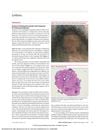Alopecia After Injection of ATX-101 for Reduction of Submental Fat
May 2017
in “
JAAD Case Reports
”
TLDR ATX-101 injections can cause hair loss.
The document reported the first known case of localized alopecia in a 37-year-old man following ATX-101 injections for submental fat reduction. The patient developed patchy beard alopecia at the injection sites one month post-treatment, which persisted for 11 months despite treatment with topical bimatoprost. The mechanism of hair loss was unclear, and further cases were needed to understand this adverse effect. While ATX-101 was generally well-tolerated with mild and transient side effects, this instance of persistent alopecia was unique and required further investigation.




